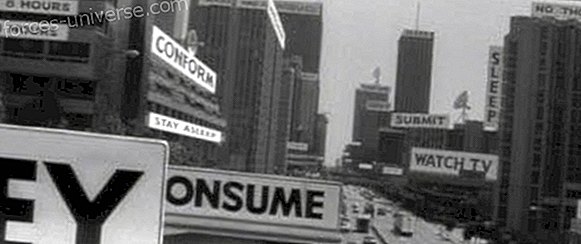
Responsible consumption seeks to satisfy true human needs in a way that respects the environment and the producers of goods and services. It is therefore the opposite of consumerism, which causes personal dissatisfaction, social and economic underdevelopment and overexploitation of natural resources. Montserrat Peirón, from the Consumer Research and Information Center (CRIC, for its acronym in Catalan) published by the Opcions magazine, offers practical information for conscious and transformative consumption. Peirón also recently participated in a conference on responsible consumption held in Vitoria and organized by SETEM Hego Haizea, Mugarik Gabe, Paz y Solidaridad and Medicus Mundi within the Consume with Sense!
Positive News: Since the crisis began, one of the main concerns of governments is to reactivate the consumption of the population to return to the growth of macroeconomics, but is the continuous growth of macroeconomics viable?
Montserrat Peirón: Well, no, it seems that it is not viable, because we are on a finite planet and consuming means taking resources from that planet. Therefore, common sense already tells us that it cannot be sustainable over time.
N +: The current economic crisis could be a good time to show people that they can live better with less, despite the insistence of governments to consume to grow again. How can the topic of responsible consumption be introduced in this very complicated context?
MP: Finding other ways to meet your needs, that do not go through the consumption of new resources and above all, what is important when exercising those other ways of consuming is to try to find the taste. That is, to really experience that consuming less is living better. We predict that in many cases there are many advantages. The important thing is that we make the effort to really see what we gain with responsible consumption on a personal level.
N +: We must also have the opposition of large multinationals, always interested in maximizing the consumption of goods, as well as the powerful distribution networks of products, which have a fundamental role in the relocated economy. Many will think that it is not possible to defeat these powerful agents by simply promoting awareness of the act of consuming. Will it not be more effective to act from the political level than from consumption?
MP: Sure, we have to act from all sides. Of course, the society we propose is to go against the tide, in the opposite direction to that of the overwhelming train, so we must necessarily cover all fronts: from conscious and transformative consumption, either individually or collectively through associations, which has to be accompanied by saying out loud why we want that other form of consumption; going through creating spaces to share experiences and help each other; to the activities of more direct pressure, either to administrations or companies and campaigns to denounce specific issues.
N +: If the formula for the continuous growth of the economy is not the right one to get out of the economic crisis, why do alternatives of action in the face of current problems bet you? ?
MP: Alternatives built for the future are not yet available. Perhaps economists, with their knowledge, can glimpse more how it could be another way of building another economic model. They know what are the parameters involved, how they play with each other and can imagine perhaps other ways. From conscious consumption, what we can say is that the clear idea is to try to minimize the use of new resources and those you use, which have the least impact, both environmentally and socially. In this sense, we come up with concrete ideas such as the reduction of working hours, such as the control of certain activities, setting a limit to certain levels of consumption through progressive rates, rewarding moderate consumption and punishing the most exaggerated consumption. But an alternative economic model a priori not even we, nor the economists can perhaps see it. Yes, they can see those clues from where you can go: working less seems pretty common sense.
N +: Nobody talks about the repercussions of the excessive growth of the rich countries in the poor countries.
MP: As the model of satisfying our needs is based in many cases on the exploitation of countries of the South, the more we consume, the more exploitation of the South. For example, many raw materials are obtained from countries in the South and under forms of exploitation, so that they are not obtained in a fair manner. Therefore, the more quantity we extract, the more exploitation we will produce. This is the current case of soybean farms in Latin America: more soybeans we want to feed our pigs, more land extensions that we sweep from there and more people we take from their houses, which are forced to go to the suburbs.
N +: Can food sovereignty be reached in underdeveloped countries through the local economy?
MP: You can aspire to arrive: hopefully we will arrive. The local economy has the advantage that it can be better controlled. Now we live in a globalized world and suddenly you find that the food of the pig farm in the town next door comes from Paraguay and you have no idea what happens there. Then, you can do little if you do not acquire that knowledge of what is happening, to see where it fails and even if you have the knowledge, it is in Paraguay! What can you do? The globalized economy really has a very high degree of complexity because of the distance and the multiple relationships of all the factors and this is something very difficult to govern in a sustainable and egalitarian way. It is almost impossible to handle that with such complexity, we would have to be gods. So, in the face of this situation, the local economy has the advantage that it is more within reach of being able to govern and administer in a better way, and that is so much the case in the North, as in the South. And one of the aspects of the local economy is food sovereignty.
N +: The function of consumption, in theory, is to meet the needs of people, but instead, the expression "consumer society" seems to mean something quite different, why does this happen?
MP: One of the needs of the consumer society, by definition, is to generate dissatisfaction. To feed the economic machinery it is necessary that we consume, as we are being told now, that the machinery is in a small break. That is, we have to think that we have to buy something, that is, I have to be dissatisfied. So, one of the important pieces in the consumer society is to generate needs or feelings that I need or even, it is good, for me and for everyone, to buy me something.
N +: Many people say that you can't live better with less, simply because nobody is willing to give up your comforts. However, virtually no one wonders if this material overabundance really makes us happier. Are we really?
MP: What are the amenities? What gives you more comfort: go by car or go by subway, train or bus? For the dominant cultural idea, the car is better, and going by public transport is for the poor. However, if you look at it calmly, the car implies having a space to store it, you have to, in the time you are in the car, dedicate it to driving it, you can find traffic jams, then you have to find a place to park. However, public transport can be more comfortable in all these aspects: it takes you, you can do while something else and you don't have to worry about anything else. So comfort is perhaps in a place where you had not thought about it mythically. It has always been thought that the more things you have, the more comfort you have, but sometimes the things you have end up causing you discomfort. Another example is that you can have the closet full of clothes and then this can create discomfort, because you need more space at home, and it can cause you the discomfort of seeing that you have bought so many things that you have not even used, and that you It generates a feeling of displeasure with yourself, like a frustration. So there are many aspects in which if we stop to think slowly, we can see that what causes us so much discomfort is consumerism and then we can conclude that you can live better by actually consuming less.
N +: Let's end the interview with a positive message: another economy is possible if ...
MP: Yes it is because we haven't always had this. The consumer society is very young, has just 100 years of history. In fact it began to take shape when it began to be produced in series and until not long ago we had as a cultural pattern that things the longer they lasted the better. But now the first commandment is to last the less the better. Therefore, if we have lived with other economies, we conclude that with another economy we can live. They do not have to be any of those that we have already passed, although perhaps positive aspects can be recovered. What has to happen to make it possible? Basically, we realize that really, as it is, it does not satisfy us and we do not find the system intelligent enough. The key is that we really give ourselves, conscientiously, that it is not something of a revolution against the system because yes, because it is the established system and we have the nature of wanting to oppose, that it also exists, but that it is because we are not convinced by the system; It is not the best way we can live for all the inconvenience it has. The first step is to see clearly that we don't like the system, and then look for solutions.
CONTACT INFORMATION:
Direction:
www.opcions.org;
www.setem.org/euskadi;
www.mugarikgabe.org;
www.pazysolidaridad.org;
www.medicusmundi.es
Author: Drafting / Daniel Jiménez.
Photo: Montserrat Peirón (right), during the talk he gave in Vitoria. Courtesy of SETEM Hego Haizea.






